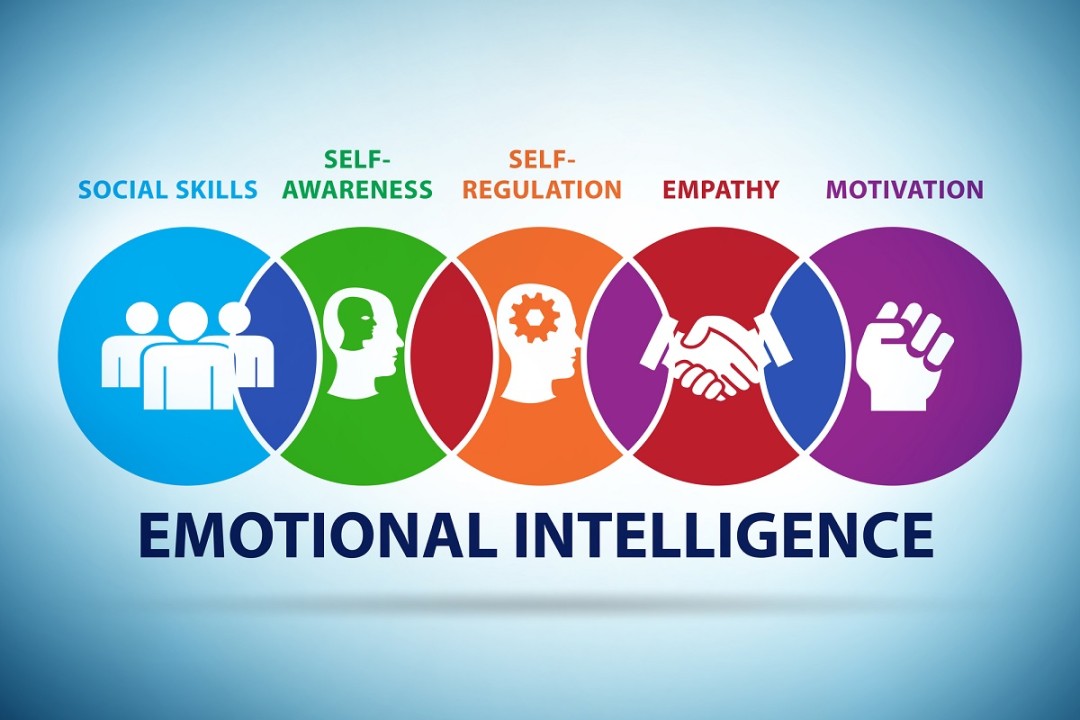In the field of human behavior and interpersonal relationships, EI has emerged as a crucial determinant of success. Unlike traditional measures of intelligence, EI focuses on the ability to recognize, understand, and manage emotions effectively in oneself and others.
Understanding EI
EI covers a spectrum of competencies that revolve around emotional awareness and management. At its core are four main components: self-awareness, self-management, social awareness, and relationship management.
Self-Awareness
The foundation of EI, self-awareness involves recognizing one's emotions, strengths, weaknesses, and their impact on others. It empowers individuals to understand how emotions influence thoughts and behaviors, facilitating introspection and personal growth.
Self-Management
Building on self-awareness, self-management involves the ability to regulate one's emotions, impulses, and behaviors in various situations. This component emphasizes resilience, adaptability, and the capacity to channel emotions constructively to achieve personal and professional goals.
Social Awareness
Also known as empathy, social awareness involves perceiving and understanding the emotions, needs, and concerns of others. It enables individuals to demonstrate compassion, anticipate responses, and navigate interpersonal relationships with sensitivity and insight.
Relationship Management
The culmination of EI, relationship management encompasses skills in communication, conflict resolution, and collaboration. It focuses on building and maintaining positive relationships, fostering teamwork, and inspiring trust and respect among peers and colleagues.
Their Importance in Personal Growth
Emotional Intelligence plays a pivotal role in personal development by enhancing self-awareness and promoting emotional resilience. Individuals with high EI are better equipped to manage stress, adapt to change, and maintain a positive outlook amidst challenges. This emotional agility not only improves mental well-being but also cultivates a sense of authenticity and self-confidence.
Social Intelligence in Professional Success
In the realm of business and leadership, social intelligence has become increasingly recognized as a critical determinant of success. Leaders who exhibit high EI traits are adept at inspiring and influencing others, fostering a collaborative organizational culture, and driving innovation and growth.
Cultivating Emotional Awareness
While some individuals may naturally possess higher levels of EI, it is a skill set that can be cultivated and enhanced through intentional practice and self-reflection. Strategies to develop EI include mindfulness practices, emotional self-regulation techniques, seeking feedback from others, and engaging in empathy-building exercises.
Emotional Intelligence in Education and Parenting
Beyond the workplace, Emotional Intelligence plays a crucial role in educational settings and parenting. Educators who incorporate EI principles into their teaching practices foster a supportive learning environment where students feel valued, understood, and motivated to succeed.
Cultural and Contextual Influence
The expression and interpretation of emotions can vary significantly across cultures and contexts, influencing individuals' Emotional Intelligence. Cultural norms, societal expectations, and familial upbringing shape how emotions are perceived, expressed, and managed. Awareness of these cultural nuances is essential for fostering cross-cultural understanding, empathy, and effective communication.
Social Intelligence and Mental Health
Social intelligence plays a pivotal role in mental health and well-being. Individuals with high EI are more adept at managing stress, coping with adversity, and maintaining positive mental health. By cultivating emotional awareness and regulation skills, individuals can mitigate the impact of negative emotions such as anxiety and depression, promoting resilience and psychological flexibility.
Ethical Considerations and EI
Ethical considerations are inherent in the practice and application of EI. While EI empowers individuals to understand and influence emotions, ethical guidelines ensure that these abilities are used responsibly and respectfully. Practitioners of EI must uphold principles of fairness, integrity, and respect for autonomy in their interactions and decision-making processes.
The Future of Social Intelligence Research and Application
As research on social intelligence continues to evolve, future directions include exploring its neural underpinnings, developmental trajectories, and implications for artificial intelligence. Advances in neuroscience offer insights into the brain mechanisms underlying emotional processing and regulation, shedding light on how EI skills are acquired, refined, and maintained throughout the lifespan.
Leadership and Organizational Culture
In organizational contexts, leaders with high social intelligence are instrumental in shaping a positive and productive work environment. Leaders who exhibit empathy, self-awareness, and effective communication skills inspire trust and motivate their teams to perform at their best.
Challenges and Opportunities in Developing
Their benefits are clear, developing and enhancing EI skills can pose challenges. Individuals may encounter obstacles such as ingrained behavioral patterns, limited emotional awareness, or resistance to change. Overcoming these challenges requires dedication, self-reflection, and a commitment to personal growth.
Their Role in Conflict Resolution and Negotiation
It plays a pivotal role in conflict resolution and negotiation by promoting understanding, empathy, and effective communication. Individuals with high EI skills can de-escalate tense situations, manage emotions constructively, and facilitate collaborative problem-solving.
Conclusion
Emotional Intelligence serves as a cornerstone of personal fulfillment and professional success in today's interconnected world. By developing skills in self-awareness, self-management, social awareness, and relationship management, individuals can navigate life's complexities with confidence, empathy, and resilience.


You must be logged in to post a comment.